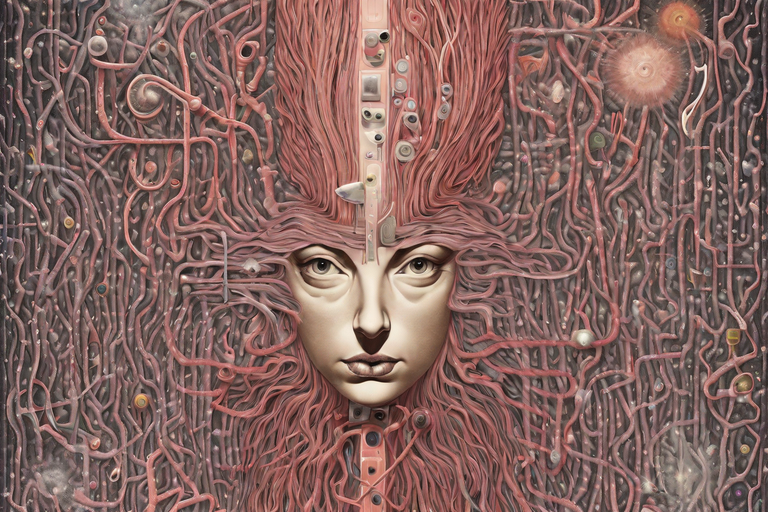The domain of cause-and-effect does not itself have a cause. This – we might say – is in the nature of ‘a basic principle’. Of course, stating as baldly as we have that ‘this is a basic principle’ immediately invites us to take issue with such a statement and ask why it should be considered as such. Why – we might ask – shouldn’t the domain of cause–and-effect have a cause? How would it get to be there, otherwise? What underpins the logical world of cause-and-effect, otherwise? What ‘supports’ it if the laws of logic don’t?
No matter how illogical the assertion that ‘cause-and-effect doesn’t have a cause’ might seem, there is physical evidence. The very fact that we live in a quantum reality rather than a Newtonian one (as used to be thought) indicates that causality is a special case, a mere subset of reality rather than the Universal Set. As Hannu Rajaniemi says, “On the Planck scale, causality becomes a variable.” When we look deep enough into the nitty-gritty of the universe, classical Newtonian mechanics (which gives rise to the domain of cause-and-effect) breaks down and so we can plainly see that the whole space-time continuum (which is logical, which is causal) rests upon another type of reality entirely, a reality that has nothing to do with logical continuity, nothing to do with rules, nothing to do with cause-and-effect. There is a tortoise there, in other words, but there is no tortoise under the tortoise. The tortoise which is ‘the continuum of logic’ has no supporting infrastructure – it is suspended in midair!
Aside from the physical evidence, we could also make the argument that logic itself has no logical basis by pointing at the insoluble logical paradoxes that spring into being the moment we try to model a universe which is entirely made up of logic, which is entirely made up of rules. We can try to imagine such a situation for sure, but it’s not going to work out. If we were to say that the world of logic, the world of rules, the world of cause-and-effect has nothing outside of it other than more logic, more rules, more cause-and-effect then we end up with a situation where logic flatly contradicts itself. Logic creates the argument that everything has to be based on logic, but then when we look into this we see that the only way this can work is if logic flagrantly contradicts itself, if logic blatantly goes against what it itself says. Clearly, there is some sort of a problem here, if this is the case!
The most essential way to look at this problem is in terms of a ‘starting paradox’ – if there is to be such a thing as a realm of being that is totally determined by cause-and-effect, then by the very logic that we are pinning our argument on there must be a cause for that realm. If there is to be such a thing as ‘a domain that is made up of rules’, then there must be a rule that specifies the need for such a domain. There has to be a rule that unambiguously states: “There must be a domain that is made up of rules”. The domain can’t come about without a rule, in other words. This doesn’t solve the problem however because then we need to find a cause for the cause that lies behind the causal realm, i.e. we need to find the rule that specifies the need for a rule to specify the need for the domain which is made up entirely of rules.
Alan Watts explains this in terms of ‘intention’ – if everything has to be deliberate, if everything has to be intended, then before we can intend something we will first have to ‘intend to intend it’. But then before we can do this we will have to ‘intend to intend to intend’, and so on, going back forever and never finding a place to actually start from. Or we could also talk about ‘deciding’ and say that in a world where nothing can happen unless we first decide to do it, we can’t just out-of-the-blue decide to do something, we first have to ‘decide to decide’, and so on and so forth. In a world where nothing can happen unless we first decide for it to happen (in a world where there has to be a rule for everything) nothing can ever happen, therefore, and so there simply can’t be such a world!
Despite the impossibility of there being any such thing as a universe in which everything is purposeful, everything is based on rules or logic, we nevertheless go around thinking this to be the case. This is what we all think. We are very much inclined to think that this is the case since the thinking mind itself can only function when it assumes the existence of an absolutely solid framework of rules. If we were to rigorously investigate what we have so blithely assumed (i.e. that rules are all there is) then we would see that there are intractable problems with such a scheme, but the point is that we never do this. We’re not exactly big on rigorous investigation. That’s not our style – our style is to make massive assumptions and then just carry on nonchalantly as if we had never made them. It may sound somewhat disparaging to say this but actually – as we have said – it’s how rational thought works. That’s the only way rational thought can work – by assuming an unquestionable basis. If something is definitely true then the rational process can go ahead and make an inference on this basis. Logic can go ahead and make an inference on this basis. It can start off on its journey. A whole self-consistent structure of logic can be constructed upon this starting-off point; an entire logical continuum springs into being. The only proviso being of course that we do need this ‘definitely true statement’ to launch off from, to start off our journey in logic from. Nothing happens without it – we don’t get started. The problem is therefore, where do we get a ‘definitely true’ statement from?
This really is a stumper. It turns out to be an extraordinarily problematical thing to prove that any particular statement is ‘unquestionably true’. Most of us would probably say that it’s the easiest thing in the world to come up with such a thing – laughably easy in fact. I can for example place my coffee cup on the table and make the statement “My coffee cup is on the table.” Bang. There you go – a definite or incontrovertible statement! Who can argue with this? We can’t create an absolutely true statement this easily however. The argument is full of holes. The apparently straightforward statement which says “My coffee cup is on the table” is itself the product of a whole load of assumptions that have been forgotten about. The statement only seems true because we have forgotten that it is supported by a whole raft of assumptions that we have been very careful not to examine! That’s the process by which we come up with ‘absolutely true statements’. That’s how we manufacture them…
Another way of putting this is to say that nothing can be determined to be true unless we first assume a framework that can then be used to ascertain whether a particular statement is true or not. The statement “My coffee cup is on the table” relies on a very specific context of understanding in order to make sense – without this specific context (which is itself not examined in any mental operation) the statement is quite meaningless, and if the statement is quite meaningless (as it stands on its own) then it can hardly be said to be ‘definitely true’! So a statement needs a context before it can be evaluated to see if it is true or not and yet that context itself is not evaluated. It can’t be evaluated because we need to assume that it is true, that it is reliable in order to use it as a basis for carrying out the evaluation! The context of understanding (the framework) rests upon whatever set of assumptions that we have taken to be ‘unquestionably true’ and yet this basis can never actually be shown to be true since it represents the blind-spot of the system – it is the ‘thing we can never actually look at’. It IS unquestionable, but only because we are constitutionally unable to question it…
The continuum of logic is a ‘palace of jewels’, therefore, where every jewel is systematically verifiable in terms of every other jewel. And the whole thing rests upon a blind-spot – it hangs on a hook that we aren’t able to see, and because we can’t see (because we are constitutionally unable to see it) this is the link in the chain that we can’t verify. This is ‘the weakest link’.Or we could equally well say that the rational mind is a ‘palace of thoughts’ where each thought makes sense in terms of every other thought and where the whole rational edifice rests upon a supposedly stable foundation stone which can function as such because we are prohibited (by the logic of the system) from ever examining it.
Thus, the realm of logical thought (which is the same thing as the domain of cause-and-effect) is akin to a dogma that relies on an act of ‘blind belief’ (or as we could also say, it is ‘a world that exists only because we say it exists’). An arrangement where every element makes sense in terms of every other one, and can be proved as being true in terms of every other one, but where there is no support, no ‘proof’ outside of this set-up, is a loop, it’s a ‘statement that agrees with itself’. Thought is a loop. Logic is a loop. This is how logic gets to be self-consistent – by being a loop. If there’s no loop then there’s no self-consistency. If there’s no loop then logic falls apart…
If there’s no closed context then there can be no such thing as ‘a definitely true statement’. If the context is open, then all the statements that we might possibly make are also going to be ‘open’, and open-ended statements are no good for building logic structures on. We can’t make any inferences on their basis – if we start with a question mark then we’re never going to be able to move beyond this question mark, into something secure, something reliable. If we are hankering after a world that is made up of ‘definites’ (a world that is made up of digitalized YES and NO answers) then we have to deny that there is any such thing as ‘the open context’. There must be no mention of it anywhere – the very idea of it must be made to sound ridiculous. If we want ‘positive knowledge’ about the world then the possibility of the Open Context needs to be banished from our awareness entirely and this – as we have already said – is exactly what the rational mind does. It is only because the rational mind assumes that the domain of logic, the domain of cause-and-effect, etc, is unquestionably ‘the whole of everything’ that there gets to be such a thing as the rational mind!
This remains however nothing more than a ‘convenient illusion’. If the domain of cause-and-effect were all that there is (if there were nothing else apart from logic, apart from cause-and-effect) then as we have said everything would immediately become impossible. The scheme just won’t work. It’s a non-starter’. The thing is therefore that the domain of logic, the domain presided over by the rational mind, needs freedom from rules in order to be there in the first place, but it just can’t afford to ever admit it…
This then is the ‘paradox of rules’ – the paradox that we never spot, the paradox that no one ever talks about. The paradox behind rules is that there is actually no way into the world of logic in the first place unless we drop logic, unless we drop rules (just as there is no way out). It’s easy to see that there’s no way out of the rules of logic unless we drop the rules, but it is perhaps a bit harder to see that there’s no way in either. The problem with breaking into a logic continuum is that there’s no rule, no logical framework for doing so. There’s no rule, no logical framework for the job because it is rules and frameworks that we are trying to break into. This is the regression paradox that we were talking about before. If my purpose is to break into the realm of purposefulness then I already am in the purposeful world and so the exercise is redundant. If I have a rule that says I have to enter into the rule-world then I’m already in it! If I’m being deliberate about it then I’m already inside ‘the world of deliberate actions’ and so this simply isn’t answering our question about how we break into it when we’re not already in it…
So how on earth do I enter the rule-world, if I don’t already have a rule saying that I have to do so? How do I break into the realm of purposefulness without deliberately intending to do so? How can I enter if I don’t already have a ‘preformed purpose’ to do so?
From a non-ironic point of view, this really is a brick wall! For the concrete (or ‘rule-based’) frame of mind, the realm of purposefulness, the realm of rules or causes or definite intentions really is a prison. It’s the ultimate prison. It’s a prison without any vulnerabilities, a prison we can never break out of. The intention to leave this prison is the prison! The goal of escaping returns us to what we are trying to escape from. The thought of not thinking is thinking. Because we can’t escape the prison of thought, the only thing left to us is therefore to adapt to it, to get used to it, make the most of it, to pretend that it isn’t a prison, to pretend that thought is in fact ‘The Whole World’ so that we don’t need to escape from it, so that the question of escaping never arises. This – needless to say – is what we actually do! Being ‘unconsciously adapted to the prison of the rational mind’ is our default stetting…
But there is a way to escape from the prison of purposefulness, the prison of rules. It’s just that we never spot it. We never spot it since the prison is actually our own mind – which is of course what we are using to try to figure it out! Nothing could be simpler then escaping from the prison of purposefulness, the prison of rules. It could be said that we just have to ‘stop taking everything so seriously’. Of course we don’t ‘have to’ stop taking everything so seriously (because that’s making it sound pretty serious) but we can stop taking it seriously. We don’t have to take it seriously. ‘No one compels us but ourselves’, to paraphrase Sir Edwin Arnold from the line in The Light of Asia.
We’re always free to see that logically-constructed EITHER/OR world that we spend all our time in isn’t real, it’s just that we don’t utilize this freedom. We don’t know that the freedom is there to utilize. We have chosen to ignore it. We have freely agreed to veil this all-important freedom from ourselves (as James Carse says) so that we can play the game of not being free…






